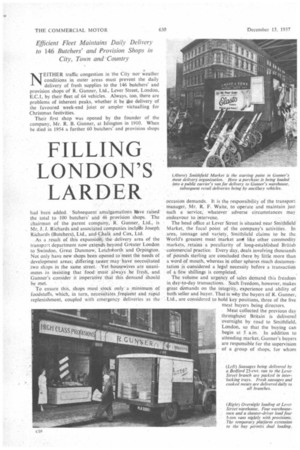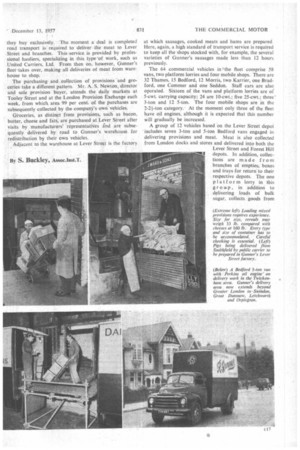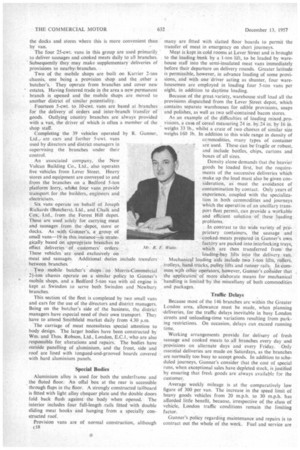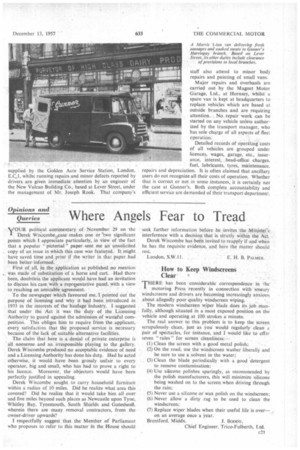FILLING LONDON'S LARDER
Page 58

Page 59

Page 60

Page 63

If you've noticed an error in this article please click here to report it so we can fix it.
Efficient Fleet Maintains Daily Delivery to 146 Butchers' and Provision Shops in City, Town and Country NEITHER traffic congestion in the City nor Weather conditions in outer areas must prevent the daily delivery of fresh supplies to the 146 butchers' and provision shops of R. Gunner, Ltd., Lever Street, London, E.C.1, by their fleet of 64 vehicles. Always, too, there are problems of inherent peaks, whether it be ihe delivery of the favoured week-end joint or ampler victualling for Christmas festivities.
Their first shop was opened by the founder of the company, Mr. R. B. Gunner, at Islington in 1910. When he died in 1954 a further 60 butchers' and provision shops
had been added. Subsequent amalgamations ve raised the total to 100 butchers' and 46 provision shops. The chairman of the parent company, R. Gunner, Ltd., is Mr. J. J. Richards and associated companies include Joseph Richards (Butchers), Ltd., and-Chalk and Cox, Ltd.
As a result of this expansion; the delivery area of the transport department now extends beyond Greater London to Swindon. Great Dunmow, Letch*orth and Orpington. Not only have new shops been opened to meet the needs of development areas; differing tastes,may have necesSitated two shops in the same street. -Yet-housewives are unanimous in insisting that food must .always be fresh, and Gunner's consider it imperatiVe.that this demand should be met.
To ensure this, shops must .stock only a minimum of foodstuffs, which, in turn, necessitates ,freqbent and rapid replenishment, coupled with ernergeney deliveries as the occasion demands. It is the responsibility of the transport manager, Mr. R._ F. Waite, to operate and maintain just such a service, whatever adverse circumstances may endeavour to intervene.
The head office at Lever Street is situated near Smithfield Market, the focal point of the company's activities. In area, tonnage and variety, Smithfield claims to be the World's greatest meat market and like other commodity markets, .retain g a peculiarity of long-established British commercial practice. Every day, deals involving thousands of pounds sterling are concluded there by little more than a word of mouth, whereas in other spheres much documentation is considered a legal necessity before a transaction of a few shillings is completed.
The volume and urgency of sales demand this freedom in day-to-day transactions. Such freedom, however, makes great demands on the integrity, experience and ability of both seller and buyer. That is why the buyers of R. Gunner, Ltd., are considered to hold key positions, three of the five meat buyers being directors.
Meat collected the previous day throughout Britain is delivered overnight by road to Smithfield, London, so that the buying can begin at 5 a.m. In addition to attending market, Gunner's buyers are responsible for the supervision of a group of shops, for whom they buy exclusively. The moment a deal is completed road transport is required to deliver the meat to Lever Street and branches. This service is provided by professional hauliers, specializing in this type of work, such as United Carriers, Ltd. From then on, however. Gunner's fleet takes over, making all deliveries of meat from warehouse to shop.
The purchasing and collection of provisions and groceries take a different pattern. Mr. A. S. Newton, director and sole provision buyer, attends the daily markets at Tooley Street and at the London Provision Exchange each week, from which area 99 per cent of the purchases are subsequently collected by the company's own vehicles.
Groceries, as distinct from provisions, such as bacon, butter, cheese and fats, are purchased at Lever Street after visits by manufacturers' representatives a'nid are subsequently delivered by road to Gunner's warehouse for redistribution by their own vehicles.
Adjacent to the warehouse at Lever Street is the factory at which sausages, cooked meats and hams are prepared Here, again, a high standard of transport service is required to keep all the shops stocked with, for example, the several varieties of Gunner's sausages made less than 12 hours previously.
The 64 commercial vehicles in the fleet comprise 58 vans, two platform lorries and four mobile shops. There are 32 Thames, 15 Bedford, 12 Morris, two Karrier, one Bradford, one Commer and one Seddon. Staff cars are also operated. Sixteen of the vans and platform lorries are of 5-cwt. carrying capacity; 24 are 10-cwt.; five 25-cwt.; three • 3-ton and 12 5-ton. The four mobile shops are in the 2-2+-ton category. At the moment only three of the fleet have oil engines, although it is expected that this number will gradually be increased.
A group of 12 vehicles based on the Lever Street depot ' includes seven 3-ton and 5-ton Bedford vans engaged in delivering provisions and meat. Meat is also collected from London docks and stores and delivered into both the Lever Street and Forest Hill depots. In addition, collections are made from branches of empties, boxes and trays for return to their respective depots. The one platform lorry in this group, in addition to delivering loads of bulk sugar, collects goods from the docks and stores where this is more convenient than by van. The four 25-cwt. vans in this group are used primarily to deliver sausages and cooked meats daily to all branches. Subsequently they may make supplementary deliveries of provisions to nearby branches. Two of the mobile shops are built on Karrier 2-ton chassis, one being a provision shop and the other a butcher's. They operate from branches and cover new estates. Having fostered trade in the area a new permanent branch is opened and the mobile shops are moved to another district of similar potentiality.
Fourteen 5-cwt. to 10-cwt. vans are based at branches for the delivery of orders and inter-branch transfer of goods. Outlying country branches are always provided with a van, the driver of which is often a member of the shop staff. Completing the 39 vehicles operated by R. Gunner, Ltd.,arc cars and further 5-cwt. vans used by directors and district managers in supervising the branches under their control.
An associated company, the New Vulcan Building Co., Ltd., also operates five vehicles from Lever Street. Heavy stores and equipment are conveyed to and from the branches on a Bedford 5-ton platform lorry, whifst four vans provide transport for the builders, engineers and electricians.
Six vans operate on behalf of Joseph Richards (Butchers), Ltd., and Chalk and Cox; Ltd., from the Forest Hill depot. These are used solely for carrying meat and sausages from the depot, store or docks. As with Gunner's, a group of small vans-19 in this instance—is strategically based on appropriate branches to effect deliveries of customers' orders. These vehicles are used exclusively on meat and sausages. Additional duties include transfers between branches.
Two mobile butcher's shops on Morris-Commercial 21-ton chassis operate on a similar policy to Gunner's mobile shops, and a Bedford 5-ton van with oil engine is kept at Swindon to serve both Swindon and Newbury branches.
This section of the fleet is completed by two small vans and cars for the use of the directors and district managers. Being on the butcher's side of the business, the district managers have especial need of their own transport. They have to attend Smithfield market daily from 4.30 a.m.
The carriage of meat necessitates special attention to body design. The larger bodies have been constructed by Wm. and Thos. Robson, Ltd., London, E.C.1, who are also responsible for alterations and repairs. The bodies have outside panelling of aluminium, and the front, side and roof are lined with tongued-and-grooved boards covered with hard aluminium panels.
Special Bodies .
Aluminium alloy is used for both the underframe and the fluted floor: An offal box at the rear is accessible through flaps in the floor. A strongly constructed tailboard is fitted with light alloy chequer plate and the double doors fold back flush against the body when opened. The interior includes four full-length rails fitted with double sliding meat hooks and hanging from a specially constructed roof.
Provision vans are of normal construction, although c I many are fitted with slatted floor boards to permit the transfer of meat in emergency on short journeys.
Meat is kept in cold rooms at Lever Street and is brought to the loading bank by a 1-ton lift, to be loaded by warehouse staff into the semi-insulated meat vans immediately before their departure on delivery rounds. Greater latitude is permissible, however, in advance loading of some provisions, and with one driver acting as shunter, four warehousemen are employed in loading four 5-ton vans per night, in addition to daytime loading.
Because of the great.variety, warehouse staff load all the provisions dispatched from the Lever Street depot, which contains separate warehouses for edible provisions, soaps and polishes, as well as two self-contained bacon stores.
As an example of the difficulties of loading mixed ..provisions, a case of cereal measuring 24 in. by 24 in. by 16 in. weighs 33 lb., whilst a crate of two cheeses of similar size weighs 160 lb. In addition to this wide range in density of commodities, many types of container are used. These can be fragile or robust, and include bottles, chips, cartons and boxes of all sizes.
Density alone demands that the heavier goods be loaded first, but the requirements of the successive deliveries which make up the load must also be given consideration, as must the avoidance of contamination by contact. Only years of experience, coupled with the specialization in both commodities and journeys which the operation of an ancillary transport fleet permit, can provide a workable and efficient solution of these loading problems.
In contrast to the wide variety of proprietary containers, the sausage and cooked meats prepared in Gunner's own. factory arc packed into interlocking trays, which are then transferred from the loading-bay lifts into the delivery van.
Mechanical loading aids include two 1-ton lifts, rollers. trolleys, hand trucks, pulley lifts and runner rails; In common with other operators, however, Gunner's consider that the application of more elaborate means for mechanical handling is limited-by the miscellany of both commodities and packages.
Traffic Delays Because most of the 146 branches arc within the Greater London area, allowance must be made, when planning deliveries, for the traffic delays inevitable in busy London streets and unloading-time variations resulting from parking restrictions. On occasion, delays can exceed running time.
Working arrangements provide for delivery of fresh sausage and cooked meats to all branches every day and provisions on alternate days and every Friday. Only essential deliveries are made on Saturdays, as the branches are normally too busy to accept goods. In addition to scheduled journeys, Gunner's consider that the cost of special runs, when exceptional sales have depleted stock, is justified by ensuring that fresh goods are always available for the customer.
Average weekly mileage is at the comparatively low figure of 300 per van. The increase in the speed limit of heavy goods vehicles from 20 m.p.h. to 30 m.p.h. has afforded little benefit, because, irrespective of the class of vehicle, London traffic conditions remain the limiting factor.
Gunner's policy regarding maintenance and repairs is to contract out the whole of the work. Fuel and service are supplied by the Golden Acre Service Station, London. E.1, whilst running repairs and minor defects reported by drivers are given immediate attention by an engineer of the New Vulcan Building Co., based at Lever Street, under the management of Mr. Joseph Rook. That company's staff also attend to minor body repairs and painting of small vans.
Major repairs and overhauls are carried out by the Magnet Motor Garage, Ltd., at Hornsey, whilst a spare van is kept at headquarters to replace vehicles which are based at outside branches and are requiring attention. No repair work can be started on any vehicle unless authorized by the transport manager, who has sole charge of all aspects of fleet operation.
Detailed records of operating costs of all vehicles are grouped under licences, wages, garage, etc., ance, interest, . head-office charges. fuel, lubricants, tyres, maintenance. repairs and depreciation. It is often claimed that ancillary users do not recognize all their costs of operation. Whether that is correct or not in some instances, it is certainly not the case at Gunner's. Both complete accountability and efficient service are demanded of their transport department.




















































































































